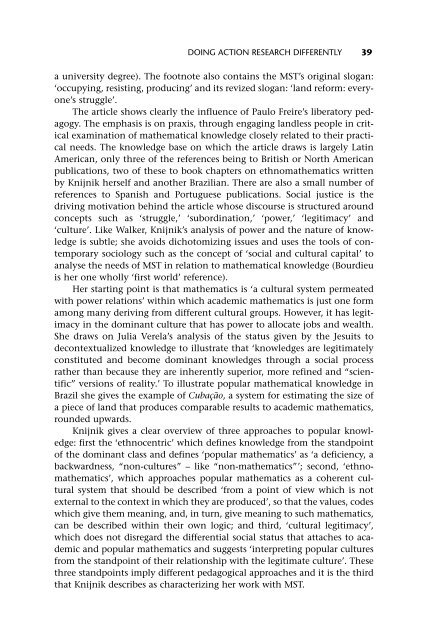Action Research A Methodology for Change and Development
Action Research A Methodology for Change and Development
Action Research A Methodology for Change and Development
Create successful ePaper yourself
Turn your PDF publications into a flip-book with our unique Google optimized e-Paper software.
DOING ACTION RESEARCH DIFFERENTLY 39<br />
a university degree). The footnote also contains the MST’s original slogan:<br />
‘occupying, resisting, producing’ <strong>and</strong> its revized slogan: ‘l<strong>and</strong> re<strong>for</strong>m: everyone’s<br />
struggle’.<br />
The article shows clearly the influence of Paulo Freire’s liberatory pedagogy.<br />
The emphasis is on praxis, through engaging l<strong>and</strong>less people in critical<br />
examination of mathematical knowledge closely related to their practical<br />
needs. The knowledge base on which the article draws is largely Latin<br />
American, only three of the references being to British or North American<br />
publications, two of these to book chapters on ethnomathematics written<br />
by Knijnik herself <strong>and</strong> another Brazilian. There are also a small number of<br />
references to Spanish <strong>and</strong> Portuguese publications. Social justice is the<br />
driving motivation behind the article whose discourse is structured around<br />
concepts such as ‘struggle,’ ‘subordination,’ ‘power,’ ‘legitimacy’ <strong>and</strong><br />
‘culture’. Like Walker, Knijnik’s analysis of power <strong>and</strong> the nature of knowledge<br />
is subtle; she avoids dichotomizing issues <strong>and</strong> uses the tools of contemporary<br />
sociology such as the concept of ‘social <strong>and</strong> cultural capital’ to<br />
analyse the needs of MST in relation to mathematical knowledge (Bourdieu<br />
is her one wholly ‘first world’ reference).<br />
Her starting point is that mathematics is ‘a cultural system permeated<br />
with power relations’ within which academic mathematics is just one <strong>for</strong>m<br />
among many deriving from different cultural groups. However, it has legitimacy<br />
in the dominant culture that has power to allocate jobs <strong>and</strong> wealth.<br />
She draws on Julia Verela’s analysis of the status given by the Jesuits to<br />
decontextualized knowledge to illustrate that ‘knowledges are legitimately<br />
constituted <strong>and</strong> become dominant knowledges through a social process<br />
rather than because they are inherently superior, more refined <strong>and</strong> “scientific”<br />
versions of reality.’ To illustrate popular mathematical knowledge in<br />
Brazil she gives the example of Cubaçāo, a system <strong>for</strong> estimating the size of<br />
a piece of l<strong>and</strong> that produces comparable results to academic mathematics,<br />
rounded upwards.<br />
Knijnik gives a clear overview of three approaches to popular knowledge:<br />
first the ‘ethnocentric’ which defines knowledge from the st<strong>and</strong>point<br />
of the dominant class <strong>and</strong> defines ‘popular mathematics’ as ‘a deficiency, a<br />
backwardness, “non-cultures” – like “non-mathematics”’; second, ‘ethnomathematics’,<br />
which approaches popular mathematics as a coherent cultural<br />
system that should be described ‘from a point of view which is not<br />
external to the context in which they are produced’, so that the values, codes<br />
which give them meaning, <strong>and</strong>, in turn, give meaning to such mathematics,<br />
can be described within their own logic; <strong>and</strong> third, ‘cultural legitimacy’,<br />
which does not disregard the differential social status that attaches to academic<br />
<strong>and</strong> popular mathematics <strong>and</strong> suggests ‘interpreting popular cultures<br />
from the st<strong>and</strong>point of their relationship with the legitimate culture’. These<br />
three st<strong>and</strong>points imply different pedagogical approaches <strong>and</strong> it is the third<br />
that Knijnik describes as characterizing her work with MST.

















